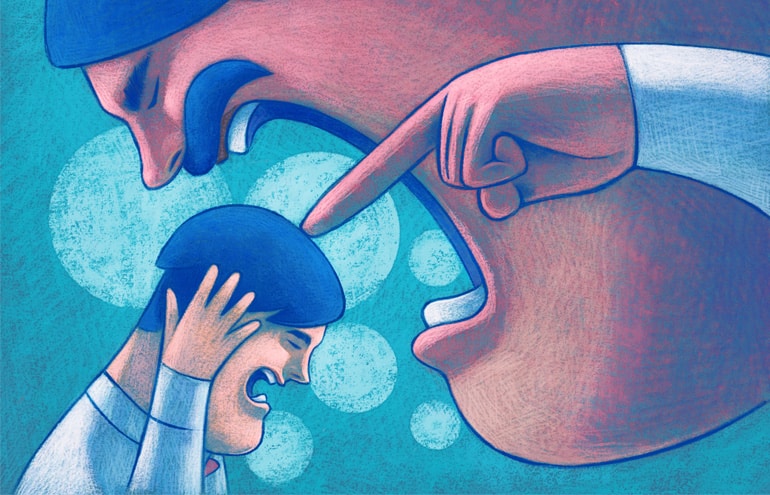It can be stressful, sometimes even nasty in a law firm. But is what you are experiencing actually bullying? Here’s how to identify law firm bullying — with dos and don’ts for confronting it.

Table of contents
A law firm can be a pretty difficult place to work. You’ve gathered together and granted power to people with expensive educations in … well, winning. In all of its various manifestations. In fact, most lawyers got there by successfully competing — for grades, for admission, for test scores, for interviews, for jobs, for partnership. And after a decade or more spent sharpening the necessary skills to win every race, they are not likely to set them aside.
Organizations comprised of people with lots in common tend to amplify those characteristics. In other words, competitive behavior is oxygen for law firms. So it’s no surprise that, under stress, people may get a bit … pushy.
Law Firm Bullying: “Only Wimps Complain”
On top of that, we still have the tradition of hierarchical and trial-by-fire training — as with the medical profession — that includes extreme work hours and often brutal emotional and intellectual situations. Plus, the economy tends to sharpen elbows when it comes to the internal competition for clients or, worse, hours.
In this environment, some pretty bad behavior can go unchecked. Object, and more than likely you’ll be told to just “man up!” and get over it.
While reasonable minds can differ — and do — on whether the John Wayne School of Swimming (throw them in, see if they sink) approach produces better doctors and lawyers, it’s going to be around for a while. But when someone’s behavior goes over the line and is disrespectful and bullying, it is most certainly not OK. For the victim, it may seem easier to take the road of least resistance and just put up with it. But you shouldn’t have to take it. I’ll even go you one further, and say that refusing to take it will make you more of an effective lawyer, not less. Not just because employees who feel unsafe are less effective, but because staring down disrespectful treatment qualifies you as an extraordinary person.
Is It Bullying?
So, yes, it can be stressful, sometimes even nasty in a law firm. But is what you are experiencing actually bullying? And would it matter? Yes, it would. The loss of power that comes with law firm bullying has an impact on your sense of well-being, your productivity and your willingness to get up in the morning and go to work. And naming it is very often the first step toward admitting it’s happening to you and then doing something about it.
A Zogby survey found that millions of Americans said they had experienced workplace bullying, while millions more reported witnessing it. Examples frequently given of workplace bullying include:
- Shouting and swearing or otherwise verbally abusing someone more junior.
- One person being singled out for unjustified criticism or blame.
- An employee being excluded from company activities or having his or her work or contributions purposefully ignored.
- Language or actions that embarrass or humiliate.
- Practical jokes, especially if they happen repeatedly to the same person.
- Consistently denying access to information needed to get the job done.
If those types of things are happening to you, it’s possible that you are the target of bullying behavior.
Let’s try to be clear about what workplace bullying is.
While there is no single accepted definition of it, there is enough agreement to get close. In general, bullying is characterized by:
- Repetition (occurs regularly).
- Duration (is enduring).
- Escalation (increasing aggression).
- Power disparity (targets lack the power to successfully defend themselves).
- Attributed intent (to humiliate or demean).
Bullying is different from aggression, which may involve only a single act. Bullying involves repeated incidents, creating an ongoing pattern of abusive behavior. So bosses who are tough or demanding or who set high standards are not necessarily bullies, as long as they are respectful and fair and their expectations are reasonable.
Or Is It You?
It would be wrong to discuss this without suggesting that you examine the flip side. Be honest with yourself about whether or not you might just be too sensitive. A raised eyebrow, a mumble under the breath, a particularly critical response to your latest work assignment? That’s not bullying. Even if it leaves you in tears. To qualify as bullying, it has to be repeated, unreasonable and abusive.
(Related: “You Will Be Bullied: Be Prepare for Direct and Stealth Attacks,” by Jay Harrington.)
You’re Being Bullied: Now What?
If you conclude that you are the target of bullying, don’t resist the label. While no one likes to see themselves as the victim, being honest about what’s happening to you and standing up for yourself can be the beginning of a much better situation. There are several routes to resolving the dilemma.
Handling a bully is by its very nature difficult, especially given that the bullying person is often in a position of power — your boss, say, or a senior partner or a client. But things aren’t going to get better on their own, and you can’t just grin and bear it forever. You have to confront the bully with his own behavior. Don’t expect that to be easy — but it will be worth it. The following dos and don’ts will help you prepare.
Confronting the Bully: Some Dos and Don’ts
1. Do get organized and pull together your thoughts before pushing back.
Planning what to say ahead of time can jolt you into action so that you are ready when the opportunity arises. Keep a diary of things that the bully has said or done. Gather a group of friends and family around you to bolster you with encouragement. Then take a deep breath and get ready to meet, preferably one-to-one and face-to-face.
- Choose a moment in time when you are feeling calm.
- Rehearse what you want to say with a friend or relative. Ask for and accept emotional support.
- Be crystal clear with the bully about what they have done and that you find it unacceptable. It may help to diffuse the heat to use “I” language. For example, “When you do that it makes me feel ….” This makes it about the effect of their behavior. Don’t editorialize. Give it to them straight and allow time to apologize. (But don’t be surprised if that doesn’t happen.)
- Explain how you want things to be different and the consequences if things don’t change. “I would appreciate it if you would be more respectful of my contribution and opinions in the future. If, after this conversation, you continue to belittle me in meetings, I’ll have no choice but to discuss the matter with the managing partner.” Or, “In the future, you are not to enter my workspace unless I invite you in.”
2. Do be aggressive about taking care of yourself and the firm’s productivity.
But don’t be “in your face” to the person who is doing the bullying. When confronting the bully, stay calm, speak with clarity, name exactly what is happening and (again) that you find it unacceptable.
There’s no need to explain or justify. The fact that you find it unacceptable is sufficient. Really.
3. Don’t expect your colleagues to speak up.
In an ideal world, your colleagues would chime in and express their own dissatisfaction with this behavior, too, because that sends a powerful message to the bully. Studies have shown that if bystanders speak up and challenge bullies, rather than just watching and hanging back, bullies are more deterred. Unfortunately, most co-workers will stay silent and hope the problem goes away on its own without involving them.
4. Do call them out.
Yes, confronting a bully may be scary. But, as Jonathan Littman and Marc Hershon suggest in “I Hate People,” bullies are “only effective when they’re on solid ground. Ground that you can take away.” They suggest: “Next time he swears or heaves a phone book, call it out. Point out that he’s swearing or yelling, and leave the room. Or end the call.” This can work in meetings as well. If the bully is talking over you, criticizing and complaining, ask directly what she would recommend instead. Or, ask her to leave the room until you finish your presentation. You need to call out the bully on your terms.
5. Don’t back down.
Perhaps the most important step is to follow through. If the behavior does change for the better, respond positively. If not, do what you threatened to do and take it to the managing partner or staff supervisor. If that doesn’t work, then it’s time to file a formal written complaint. Remember, bullies are like naughty children. They know it’s wrong so they don’t want to be found out.
6. Don’t be surprised if all doesn’t go smoothly.
You are ruffling feathers. Making waves. Rocking the boat. Whatever you want to call it, you are challenging and confronting someone else’s disrespectful behavior and perhaps the status quo. The outcome may not be neat and tidy. Whatever happens, though, you’ve nothing to gain by gossiping about bullying incidents or whining to colleagues. It’s important for you to be the grown-up who can name disrespectful behavior for what it is, with the quiet strength that comes from knowing you are doing the right thing.
Be proud of the courage it takes to do something about this problem and take care of yourself.
Thanks to Jennifer Fay for previously contributing to this post. Jennifer, who has a master’s degree in psychology and has taught at the elementary school level, co-wrote the groundbreaking book “No More Secrets: Protecting Your Child From Sexual Assault,” with Caren Adams.
Image © iStockPhoto.com.

Don’t miss out on our daily practice management tips. Subscribe to Attorney at Work’s free newsletter here >






















